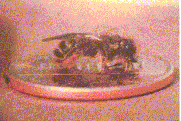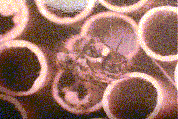|
|
|
|
|
|||||||||||||||||

|
|||||||||||||||||

|
|||||||||||||||||

|
|||||||||||||||||
|
|
|||||||||||||||||
|
|
|||||||||||||||||
|
Osmia cornifrons (Hornedfaced bee) is a native of Japan and has been used successfully for over 50 years for the pollination of commercial orchards there. This bee was introduced into the USA by Dr. Suzanne Batra of the USDA as a beneficial insect. It was then originally distributed to about 25 states and field released for survival testing. It was determined that good survival rates were received everywhere tested when at least 250 bees were introduced into the area and that they can readily occupy the humidity range of Osmia lignaria lignaria. However, it is best to protect the Hornfaced bee from temperatures below 0º f.. By storing them in an insulated, unheated shed. Note: I have left them outside through - 20º f. with no problems. |
|||||||||||||||||
|
|
|||||||||||||||||
It uses only existing open nesting holes. It stings only for self preservation and is not aggressive about protecting itself or its nests. So don't grab one and pinch it and they will leave you alone. Even if you disturb their nest when they are in them - they will normally stay in their nests and hide. If they are approaching the nests and see you bothering the nest they will stay back and wait until you have left to return to their nests. If you do grab one and pinch it their sting feels like a small sliver. They do not loose their stingers after stinging. They are not susceptible to any mites that are affecting honeybees - their biology and nesting methods are too different. They pollinate completely over 99% of every apple bloom visited! Hornedfaced bees average 8 bees to each nest. Each female Hornedfaced bee completely pollinates up to 2400 blooms per day in good weather - compared with 1600 for the Blue Orchard bees and only 30 for Honeybees. They are only active for about 6 - 8 weeks in the spring. |
|||||||||||||||||
|
This passive hard working bee is truly easy to raise. |
|||||||||||||||||
|
|
|||||||||||||||||
|
Cherry, Peach,Plum, Pear, etc... | Apple Orchard Management | Bee Storage tips | EZBEE Nesters | Humidity Map | Ordering information |
|||||||||||||||||
|
|
|||||||||||||||||
|
|
|||||||||||||||||
|
|
|||||||||||||||||